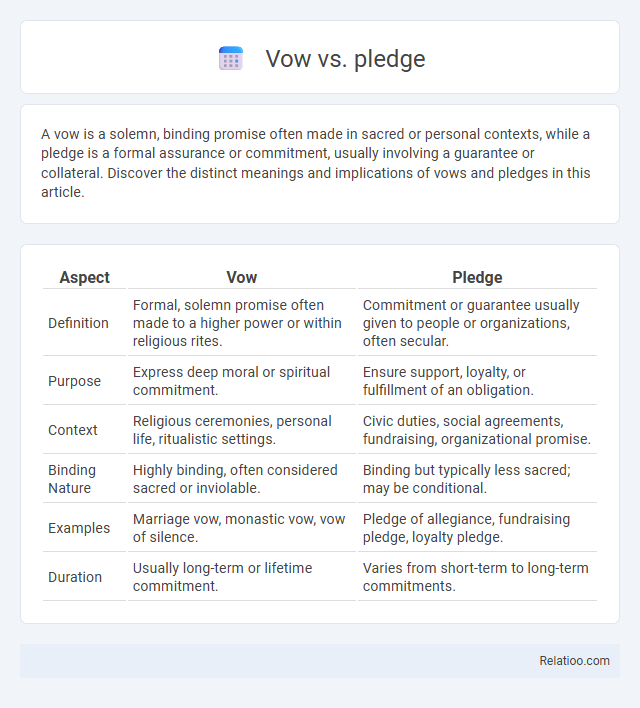A vow is a solemn, binding promise often made in sacred or personal contexts, while a pledge is a formal assurance or commitment, usually involving a guarantee or collateral. Discover the distinct meanings and implications of vows and pledges in this article.
Table of Comparison
| Aspect | Vow | Pledge |
|---|---|---|
| Definition | Formal, solemn promise often made to a higher power or within religious rites. | Commitment or guarantee usually given to people or organizations, often secular. |
| Purpose | Express deep moral or spiritual commitment. | Ensure support, loyalty, or fulfillment of an obligation. |
| Context | Religious ceremonies, personal life, ritualistic settings. | Civic duties, social agreements, fundraising, organizational promise. |
| Binding Nature | Highly binding, often considered sacred or inviolable. | Binding but typically less sacred; may be conditional. |
| Examples | Marriage vow, monastic vow, vow of silence. | Pledge of allegiance, fundraising pledge, loyalty pledge. |
| Duration | Usually long-term or lifetime commitment. | Varies from short-term to long-term commitments. |
Understanding the Core Meaning: Vow vs Pledge
A vow is a solemn promise often made with deep personal or spiritual significance, usually involving a commitment to oneself or a higher power. A pledge is a formal assurance or guarantee, typically given publicly or in a social context, emphasizing accountability and often linked to fulfilling obligations or supporting causes. Understanding the difference highlights that vows carry emotional or moral weight, while pledges emphasize external commitment and responsibility.
Historical Origins of Vow and Pledge
Vows and pledges both originate from ancient social and cultural practices where verbal commitments held significant moral and legal weight. Vows historically stem from religious or spiritual contexts, often involving solemn promises made to deities or sacred entities, reinforcing personal or communal integrity. Your understanding of the distinctions deepens by recognizing that pledges emerged as more secular, contractual promises, frequently used in medieval oaths and modern agreements to guarantee future actions or support.
Contextual Usage in Daily Life
A vow is a solemn promise often made in a personal or religious context, like marriage vows where you commit to lifelong loyalty. A pledge typically involves a formal or public commitment, such as pledging support to a cause or organization. You might use a vow for deeply emotional promises, a pledge for social or political commitments, while "vow" and "pledge" both imply strong intention but differ in situational appropriateness.
Legal and Ceremonial Implications
A vow, pledge, and oath each carry distinct legal and ceremonial implications, with a vow often representing a solemn promise made in personal or religious contexts that may have binding moral force rather than legal. A pledge typically involves a formal commitment or guarantee, often used in financial or contractual agreements to ensure compliance or performance. An oath is a legally binding declaration, frequently invoked in courtrooms or official ceremonies, where the individual swears to tell the truth or fulfill duties under penalty of perjury or other legal consequences.
Emotional Weight: Vow vs Pledge
A vow carries a profound emotional weight, often linked to personal and spiritual commitment, making it a solemn promise with deep significance. A pledge, while serious, typically emphasizes a formal assurance or guarantee, frequently used in legal or organizational contexts with a focus on responsibility rather than personal emotion. Understanding these differences highlights how vows resonate more deeply on an emotional level, symbolizing heartfelt dedication, whereas pledges convey a more external obligation.
Language Nuances and Synonyms
Vow, pledge, and oath all signify solemn promises but differ in formality and context; a vow often implies a deeply personal or spiritual commitment, whereas a pledge usually denotes a formal, public promise, and an oath carries legal or official weight with an emphasis on truthfulness. Synonyms for vow include promise, commitment, and covenant, highlighting its intimate or religious undertone. Pledge shares synonyms like guarantee, assurance, and bond, reflecting trust and obligation, while oath is closely related to affirmation, swear, and testimony, underscoring its juridical and solemn characteristics.
Common Examples in Society
Vows often appear in wedding ceremonies as solemn promises between partners, while pledges commonly involve commitments to causes, such as environmental pledges to reduce carbon footprints. Promises broadly cover everyday commitments, like assuring a friend to meet by a certain time, illustrating varying degrees of formality and social context in these expressions of intention. Each term reflects different layers of obligation and cultural significance in societal interactions.
Vow vs Pledge in Literature and Media
In literature and media, a vow is often portrayed as a solemn, binding promise typically made before a higher power or in a moment of deep personal commitment, carrying profound emotional weight and lasting consequences. A pledge, on the other hand, is commonly depicted as a formal or public declaration of intent or support, sometimes seen as less binding but equally significant in social or political contexts. Your understanding of these terms can enhance the analysis of character motivations and narrative stakes in storytelling.
Cultural and Religious Perspectives
Vows, pledges, and oaths each carry distinct cultural and religious connotations, shaping their significance in various traditions. Vows often represent solemn promises made before a deity or spiritual figure, deeply rooted in religious ceremonies and personal commitments, while pledges tend to be less formal, symbolizing loyalty or dedication within social or communal contexts. Understanding these differences enriches your appreciation of how diverse cultures and faiths honor commitments through unique rituals and language.
Choosing the Right Word: Vow or Pledge?
Choosing the right word between vow and pledge depends on the context and intensity of your promise. A vow is a solemn, often personal commitment usually related to moral or spiritual promises, while a pledge is a formal or public guarantee, sometimes involving a symbolic gesture or collateral. When making a serious, heartfelt promise, you often choose a vow; for a commitment involving trust or support, a pledge better conveys your intent.

Infographic: Vow vs Pledge
 relatioo.com
relatioo.com